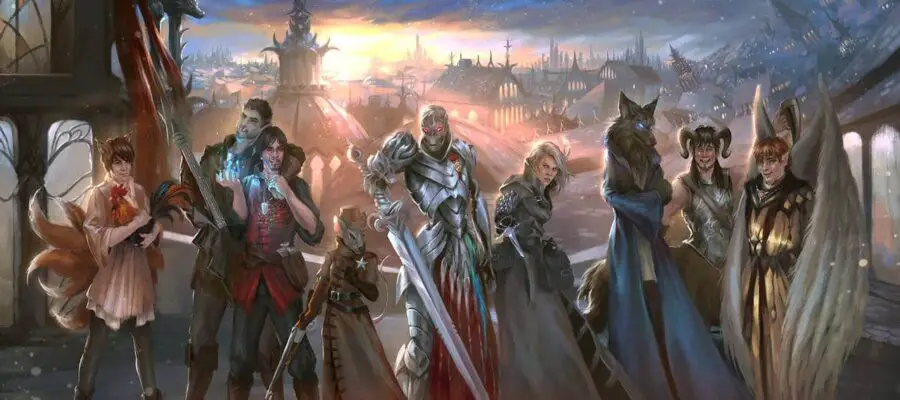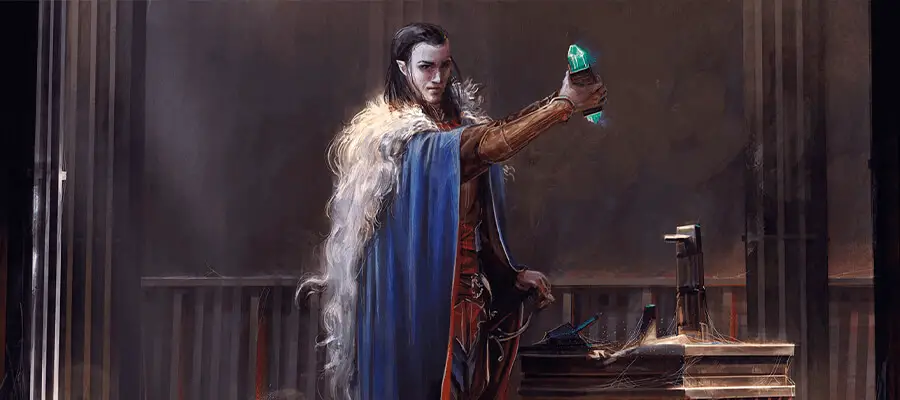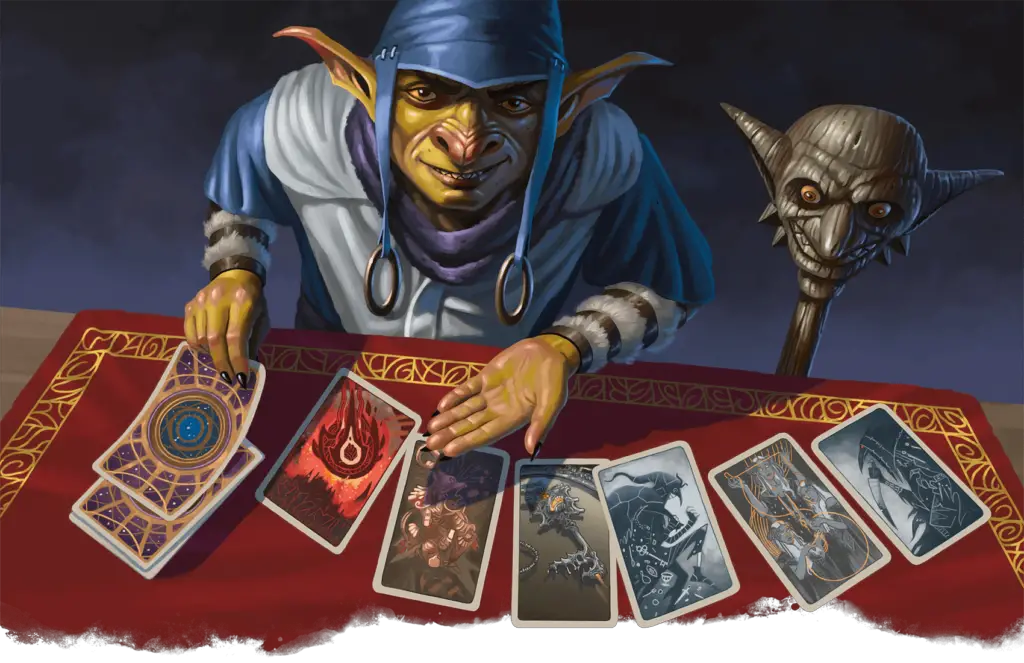New D&D player mistakes article featured image is “Last Argument Adventuring Company, Sigil” by cyberaeon, CC Attribution-Noncommercial-No Derivative Works 3.0 License
Dungeons and Dragons has a slight learning curve in mechanics, roleplaying, and how players approach the game. Most consistently, I’ve seen new players begin cautiously and usually not as synergistically with experienced players as they will eventually learn to be.
Unfortunately, this dynamic of new D&D players not jiving with old players deters mature groups from introducing novices into their flocks. How can new players bypass this learning curve, and how can Dungeon Masters help integrate new players?
Here are seven new D&D player mistakes and our suggestions on how to fix them.
New D&D players tend to be suspicious of everything the Dungeon Master includes.
Time and time again, new players will wonder if the DM is pulling the wool over their eyes with NPCs, locations, and plot devices. They don’t understand how stories develop in D&D and see the game as a puzzle to conquer. Instead, DM’s are weaving the tapestry of a new world filled with intricate people and real-world morals.
Players: Interact with characters as you would a normal person in real life. If you are suspicious, ask to roll an Insight check, or ask about body language and signs that would confirm your suspicions. When a DM does not offer proof, accept that the NPC may be genuine. Similarly, with environments, use your in-game skills such as investigation and perception, or checking for traps, to determine your safety. Then, move forward boldly and interact with that world. You’ll begin to learn the style of your Dungeon Master, and these steps will become usually unnecessary. New D&D player mistakes like this are avoidable!
Dungeon Masters: Start your campaigns off with NPCs who don’t sow suspicion or speak with intimidation. This doesn’t mean they must be boring, but help your new players learn the game at face value before introducing too much intricacy. When players guess the motives of NPCs correctly, allow them the truth and let them play that out. Don’t let a big reveal overshadow your players’ need to trust you. When your players are duped, they will feel cheated and no longer enjoy the game.
New D&D players are rightfully unsure of roleplaying.
Unless dutifully familiar with improvisation or theatrics, roleplaying can be a stumbling block for first-time players. Unfortunately, this may last an entire campaign, and some players may never feel totally comfortable speaking in character. This is unfortunate, as roleplaying brings immersion into a world and depth into a game.
Players: Speak in first-person rather than passively about your character. Say “I do this” and speak conversationally to NPCs instead of describing the nature of what your character says or does. Eventually, you may feel comfortable throwing in speech quirks like voices, accents, mannerisms, etc.
Dungeon Masters: See our article How to Get Players to Role Play for ten tips on how to encourage your players to role play.
New D&D players care too much about their characters.
Nobody likes to lose, and nobody wants their character to die. There is a fine line between doing one’s best to stay alive and accepting one’s fate. Fearing the death of one’s character can cause frustration with the DM, reap animosity toward fellow players for not going along with one’s idea (which surely would have kept one from dying!), and may derail the DM’s plans.
Players: Remember that this is just a game. If your character Borax the Barbarian dies in combat, accept it. Then come back with a new character, Torax the Barbarian, at the same level and with the same skills. Or, create a brand new character and enjoy the diversity of the game. The point is this: everyone is here to have fun, and taking the game too seriously will prevent others from achieving that goal. This isn’t a game to be “won,” but rather, it is a world to be created. Characters die, and players must move on. Do so with grace, and you will become a strong player whom others will want to invite.
Dungeon Masters: Obviously don’t plan for a total party kill, but also don’t brush over someone’s death as a common thing. Give that character the homage they deserve as a noble adventurer and strong influence on the world you have built. This will help a player move on. Theatrics always make for great death scenes.
New D&D players are often uncertain of the sandbox style, or sometimes they are too liberal with the open world.
A good DM will be ready for whatever players decide to do, but DMs do not always have the world entirely built out or the next adventure hook ready. In a sandbox-style adventure, the two extremes of the spectrum either give players too much liberty or not enough structure. This can result in players unsure of what to do next or players refusing to follow the DM’s hints.
Players: Interact with NPCs to gain information about what the DM has planned, then try your best to follow the story. Do NOT ditch the plan and go frollic somewhere unheard of. Do NOT get scared that a plan will lead to sudden death and refuse to stick with the party. Trust in your DM that they also just want to have fun, and total-party kills are hardly that.
Dungeon Masters: Give clear hints through NPCs and in-game phenomena about the players’ next lead. Allow for some variance, and understand how you can apply your ideas to any scenario players may choose to explore. End a session short if you are vastly unprepared for what players want to do. This is always better than fumbling through the next thing for several hours.
New D&D players may act out in the game when bored.
Unfortunately, boredom may occur in a session. Remember, Dungeon Masters are not expert writers, nor are players perfect actors. Everybody will have their own in-game quirks and interests that will detract from what you want to do. D&D is not a single-player game. Everyone will have their moments in the spotlight. Players must understand this and allow it to happen.
Players: Don’t disengage, don’t start chopping off heads. It’s the nature of the game that others need their moments to shine, and you may hardly be at the center of it. To be a good co-player, chill out and engage in whatever is happening, but allow others to have their moments. New D&D player mistakes like this can be an honest cry for help, but it shouldn’t be done in frustration!
Dungeon Masters: Allow for individual fun, but keep your tangential players reigned in. If one player is forcing attention upon himself for too long, find a way to bring the other players in or simply move on. You command the game pacing. Do not be intimidated into pleasing one at the risk of boring the others.
New D&D players think that there is only one way to play.
D&D is designed such that not every player has proficiencies in every skill. One excels at his skills, and others will excel at theirs. When one player takes command of every situation, the other players suffer in not exercising their creativity in problem-solving.
Players: Give everyone a chance to use their abilities and ingenuity to take center stage. You may discuss what you think is best, but don’t push it, and don’t be downtrodden when your ideas aren’t accepted. If you have particular skills that perfectly help a scenario, offer your help and allow others to do the same.
Dungeon Masters: Encourage shy players to talk and find ways to solve problems in-game. When they do something unique, point out that it was a great way to go about the issue. This will embolden them to follow their instincts more, bringing more diversity to the game. Develop scenarios that play to individual players’ strengths and point out in-game that certain players have more insight into an issue than others.
New D&D players are more apt to start party conflict.
It is true that conflict makes interesting stories, but inner-party conflict only exacerbates ill feelings and annoyance. Unwarranted conflict can come from feeling like one’s ideas aren’t acknowledged, seeing another player take desired loot, and belittling a player’s idea when something goes awry.
Players: Let the DM create conflict with the tasks at hand and the story. Don’t put too much stock in getting certain loot. Avoid taking things personally or offensively. Don’t fret when a play goes wrong. Be amused by all things in the game and find happiness in the success of your fellow player, and emotions will never reach a stressful level that causes players to quit.
Dungeon Masters: When you see players’ tensions rise, you must find a resolution promptly or end the session to allow tempers to simmer. When dropping loot, say that a specific individual finds certain items, and don’t let it be up-in-the-air who finds what. If it is intended for one person to find the perfect item for them, ensure that they find it, and allow other players to find equally impressive things in the campaign. In other scenarios, if players begin to fight about what to do in a situation, give them a tight time limit before something bad happens. The enemy will become the situation at hand rather than each other.
Conclusion: New D&D Player Mistakes Are Preventible
To new players, the best advice one could give would be that Dungeons and Dragons is simply an inconsequential game that has the goal of having fun. D&D is not a single-player game with a traditional win condition. It is an intricate story of diverse personalities and endless possibilities.
If a new player keeps to the basic rules of trusting the Dungeon Master and fellow players, finding fulfillment in interacting with the world actively rather than passively not caring about the outcome of any given event or their character, then a new player will surely flourish and ensure that all who play will also enjoy the game.




